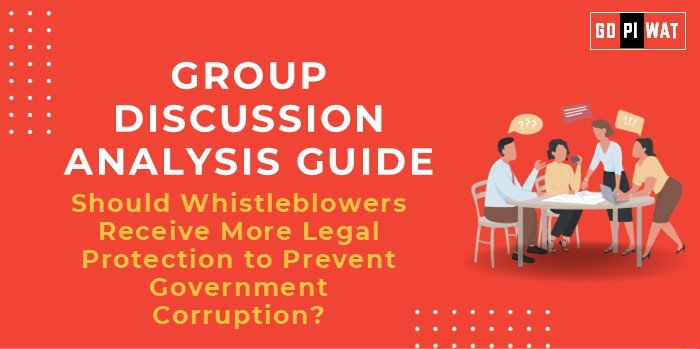📋 Group Discussion Analysis Guide: Should Whistleblowers Receive More Legal Protection to Prevent Government Corruption?
🌐 Introduction to the Topic
Context Setting: Whistleblowing has been a cornerstone in uncovering corruption scandals worldwide, from the Panama Papers to India’s Vyapam scam. With corruption estimated to cost $3.6 trillion globally each year, legal protection for whistleblowers is a vital policy issue.
Background: Despite frameworks like India’s Whistleblowers Protection Act, 2014, and global conventions such as the UN Convention Against Corruption (UNCAC), enforcement gaps persist, leaving whistleblowers vulnerable to retaliation.
📊 Quick Facts and Key Statistics
- 💰 Corruption Cost: $3.6 trillion globally; ~5% of GDP lost annually (Transparency International).
- ⚠️ Whistleblower Retaliation: Over 60% of whistleblowers report harassment (OECD).
- 📜 Legal Framework: Only 42% of countries have dedicated whistleblower protection laws (World Bank).
- 🌍 India’s Rank: 85/180 in the Corruption Perception Index (Transparency International, 2023).
👥 Stakeholders and Their Roles
- 🏛️ Government Agencies: Drafting and implementing protection laws and ensuring justice.
- 📰 Media: Amplifying whistleblowers’ voices and exposing corruption.
- ⚖️ Judiciary: Ensuring swift trials and upholding the rule of law.
- 🤝 Civil Society Organizations: Advocating for whistleblower rights and monitoring cases.
🏆 Achievements and Challenges
✨ Achievements:
- 📜 India’s RTI Act: Unveiled corruption in various sectors, enabling accountability.
- 📂 Case Study: Edward Snowden exposed NSA’s mass surveillance, sparking global debates on privacy.
- 🌍 International Example: EU’s 2019 Directive on whistleblower protection strengthened rights across 27 countries.
⚠️ Challenges:
- 📉 Weak implementation of protection laws (India’s Act remains underutilized).
- 🚨 High personal risk for whistleblowers (e.g., harassment, dismissal).
- 📢 Lack of public awareness about whistleblower rights.
🌍 Global Comparisons:
- 🇺🇸 US: The Whistleblower Protection Act provides financial rewards and robust safeguards.
- 🇳🇴 Nordic Countries: Promote anonymous reporting channels, achieving higher transparency rankings.
📋 Structured Arguments for Discussion
- 👍 Supporting Stance: “Enhanced protections encourage accountability, reducing corruption at systemic levels.”
- 👎 Opposing Stance: “Overprotection risks misuse, leading to false allegations and legal inefficiencies.”
- ⚖️ Balanced Perspective: “Whistleblower protection is essential but requires stringent checks to prevent misuse.”
💬 Effective Discussion Approaches
- Opening Strategies:
- 📂 Start with a case study: “In the Panama Papers case, whistleblowers revealed $11 trillion in hidden assets.”
- 📊 Use a striking statistic: “Corruption costs the global economy $3.6 trillion annually.”
- Counter-Argument Handling:
- 📢 Address misuse concerns with safeguards like anonymous reporting.
- 📈 Highlight success stories where whistleblower laws exposed corruption effectively.
🔍 Strategic Analysis of Strengths and Weaknesses
- 💡 Strengths: Encourages transparency, deters corruption, strengthens democracy.
- ⚠️ Weaknesses: Risk of false reporting, slow judicial processes.
- 🌟 Opportunities: Integration of AI in monitoring whistleblower submissions.
- ⚡ Threats: Retaliation and misuse of legal protections.
🎓 Connecting with B-School Applications
- 📈 Real-World Applications: Studying the role of governance in corporate management or public administration.
- 🤔 Sample Interview Questions:
- How can corporations protect whistleblowers while maintaining confidentiality?
- Discuss a case where whistleblowing led to major corporate changes.
- 📖 Insights for Students: Understanding whistleblower protection laws prepares future leaders for ethical decision-making.
📄 Source: GD and WAT preparation frameworks, 2024.


